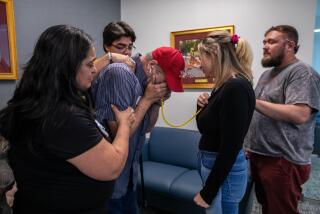National Donor Pools for Organs, Marrow, Blood Are Small
- Share via
There are never enough blood, marrow or organ donors.
Even as the American Red Cross emphasizes the need for more Latino blood donors, it and other agencies continue to hope for more donors of all ethnic groups to help cope with a variety of illnesses or emergencies.
“People are not aware of the process of organ donations,” said Nancy Fox, a director at the Regional Organ Procurement Agency of Southern California (ROPA). “Families are not aware of the wishes of their loved ones.”
Fox said there are nearly 40,000 people on the rapidly growing national transplant waiting list. In Greater Los Angeles, there were about 2,300, based on the latest figures available, she said.
Yet there were fewer than 5,000 people in the national organ donor pool at the end of last year, she said.
Officials said donors are needed from all ethnic groups, but Latinos and blacks are greatly underrepresented in the donor pool. Same-race and ethnic matches are not required for transplants, but closer tissue matches help prevent organ rejection by recipients, they said.
Fox said that since 90% of all organ donors are deceased, it is vital that families talk about whether members support or oppose organ donations.
More information is available from ROPA at (800) 933-0440.
Meanwhile, the Red Cross is trying to publicize the need for various components of whole blood: red cells, white cells, platelets and plasma.
Platelets, for example, are required in the body to control bleeding. Many chemotherapy and radiation-therapy patients are unable to produce enough platelets, which means they can suffer life-threatening hemorrhages.
One way the Red Cross attempts to attract donors is with a pamphlet--”Let Us Take Your Platelets Out For A Spin.”
Platelets are withdrawn through a process called apheresis. Blood is drawn from a donor’s arm and sent to a machine where the platelets are separated from the other blood components, which are returned to the donor.
Also needed are marrow donors who can help people fight leukemia, aplastic anemia or other fatal blood diseases.
Marrow, which is a liquid, is collected from the back of a donor’s pelvic bone using a special needle and syringe. The donor typically stays in a hospital overnight and may feel some lower-back soreness for several days, but the marrow replenishes itself within a few weeks.
Anyone wanting more information from the Red Cross may call (213) 739-5200. Appointments may be made by calling the Red Cross at (800) 448-3543.
The National Marrow Donor Program may be reached at (800) 627-7692.
More to Read
Sign up for Essential California
The most important California stories and recommendations in your inbox every morning.
You may occasionally receive promotional content from the Los Angeles Times.













